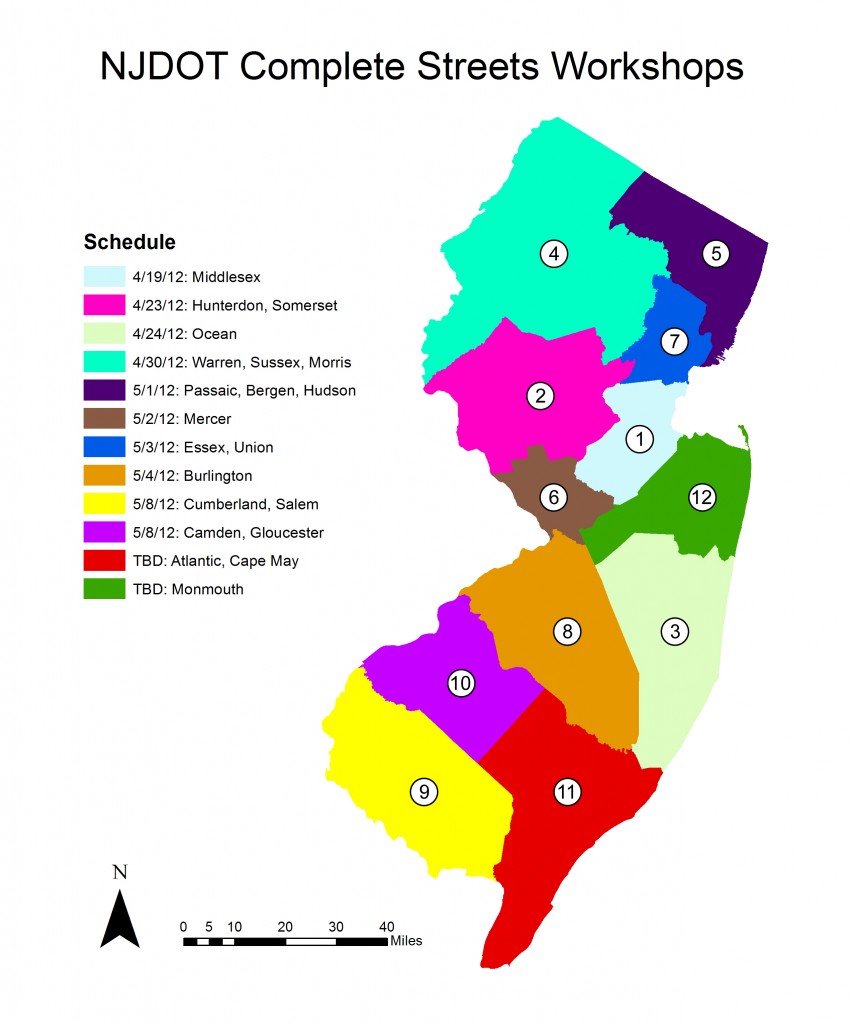
While the New Jersey Department of Transportation’s adoption of a complete streets policy in 2009 has led to some pedestrian- and cyclist-friendly improvements on state-controlled roads, a new program for municipal officials will help capitalize on another crucial source of progressive transportation infrastructure: local governments.
The recently announced initiative—a series of invite-only complete streets workshops—will bring the state’s pedestrian and cyclist safety expertise to New Jersey municipalities. The events will connect municipal officials with teams of experts, who will educate attendees on the benefits of complete streets and strategies for building roads that accommodate all users. So far, 26 New Jersey municipalities and one county have adopted complete streets policies, and the workshops will help grow these ranks.
New Jersey Municipalities Work Towards Complete Streets
NJDOT’s workshops will build on a wave of local pedestrian safety initiatives in New Jersey. This month, for example, the School District of the Chathams is holding Walk and Bike to School week, which is part of an effort to reduce vehicular traffic and prioritize safety around the area’s educational institutions. The week’s events include cyclist safety classes, driver training, walking route recommendations, and “walking school buses,” in which parents will chaperone groups of children to school on foot.
The event is just a small part of the Chathams’ efforts to improve bike and pedestrian safety. Chatham Borough recently adopted a complete streets resolution, successfully campaigned to reduce the speed limit near some local schools, and received a $65,000 grant to improve pedestrian safety along Kings Road. The ultimate hope is to get a federal Safe Routes to Schools grant to make the Chathams’ school areas even safer for young pedestrians and cyclists.
Signs of local interest in enhancing pedestrian and cyclist safety are popping up throughout New Jersey. Freehold’s mayor recently led a bike ride, a bicycle safety day is set to take place in Lodi, and last year, the state’s Safe Streets to Transit program had so many applicants that it could only fund about 8% of them.
Moving Forward
In an attempt to ensure that citizens are aware of the progress being made to improve safety for all users of New Jersey’s roads, NJDOT has promised to build a website that tracks complete streets implementation. The website, which will show which projects include complete streets components and which have been exempted from the requirements, should be operating by June. In the meantime, New Jersey legislators should make sure that the state’s budget provides funds for the life-saving complete streets projects that the public demands. NJDOT Commissioner Jim Simpson is expected to testify before the Senate Budget Committee on April 24 at 10:00am, and legislators should make sure his department is devoting proper attention to pedestrian and cyclist safety.

[…] of Transportation—Not content with its own internal complete streets policy, NJDOT is now helping municipal officials make their roadways friendlier to pedestrians and cyclists. A series of […]
[…] policies also come at a time when New Jersey Department of Transportation recently launched its Complete Streets Workshop tour. The workshops, which are by invitation only, will connect […]
[…] policies also come at a time when New Jersey Department of Transportation recently launched its Complete Streets Workshop tour. The workshops, which are by invitation only, will connect […]
[…] this month’s New Jersey Department of Transportation complete streets workshop in Mercer County, South Brunswick High School (SBHS) Student Council President Ian Moritz and […]
[…] this month’s New Jersey Department of Transportation complete streets workshop in Mercer County, South Brunswick High School (SBHS) Student Council President Ian Moritz and […]
[…] is by no means the first. In part due to the New Jersey Department of Transportation’s extensive outreach and website, municipalities across the state have adopted complete streets at a rapid pace in […]
[…] consider looking into how other state DOTs share Complete Streets information. For example, both New Jersey and Massachusetts conducted Complete Streets training workshops for engineers, advocates and […]
[…] consider looking into how other state DOTs share Complete Streets information. For example, both New Jersey and Massachusetts conducted Complete Streets training workshops for engineers, advocates and […]